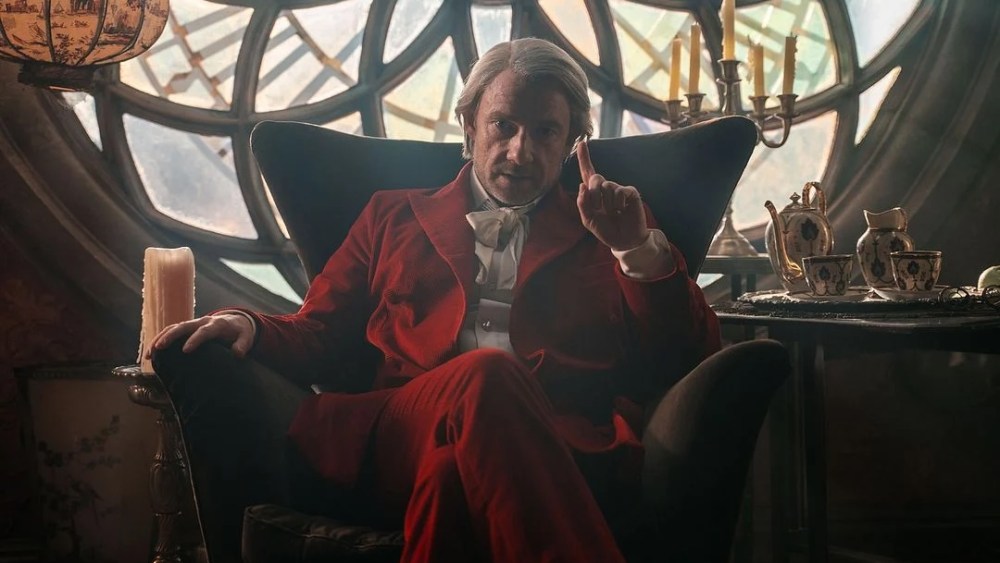Martin Freeman Controls Time in Sentimental Fantasy
Given the pressures of modern existence, it’s clear why an adaptation of Michael Ende’s 1973 novel “Momo” would appear utterly relevant in 2025. More than ever, the hours in the day seem insufficient.
In writer-director Christian Ditter’s glossy take on the fantastical story about the preciousness of time, an enigmatic red-haired girl named Momo (Alexa Goodall) lives inside the amphitheater of an unnamed European city (perhaps closest in look to Rome). Locals take an interest in Momo given her special talent for listening to people. When someone confides in her, the speaker feels magically compelled to be truthful. They leave the exchange feeling relieved and acknowledged, a rarity in the attention-starved era of the internet. Strangely, instead of being integral to the narrative as a whole, Momo’s fit serves as the vehicle for her to learn the Grey corporation’s villainous plans.
Those who work for Grey are “time thieves,” otherworldly entities that rely on stealing hours from humans to live. Their ploy to do so is convincing the populace to wear bracelets that monitor when they use their time in a productive manner or when they “waste” it on enjoyment. All the time saved, they think, will accumulate for them to spend it with their loved ones or pursue their passions later in life. It’s a straightforward cautionary tale about how modern economic systems demand productivity and consumption, while robbing the masses of the energy and space to chase fulfilment during their all-too-finite lives. However, the way time is actually extracted or how it might be returned to the person saving it is left unexplained. For a film that also introduces other well-defined futuristic technology as not-so-distant threats, the lack of concrete mechanics for this core aspect feels disappointing.
Momo’s mysterious origin as a young girl who appeared without a family makes for an intriguing departure point. But once she accepts her mission to save everyone else from the time thieves, the heroine isn’t allowed any ambivalence or contemplation about her future or her past. And while that’s in line with the notion of living in the moment, one wonders if the character doesn’t long for a parent, or to go to school, or to experience life as other kids her age do. Does she not question why she was chosen or created? Momo comes across more like a concept than a person. Goodall’s charismatic performance should certainly further her nascent career, but within “Momo,” there are built-in limitations to what she can showcase emotionally beyond unwavering determination.
Aside from the amphitheater’s good-natured janitor Beppo (Kim Bodnia), Momo’s most meaningful relationship is her friendship with Gino (Araloyin Oshunremi), a teenager working multiple jobs to help his mother Liliana (Jennifer Amaka Pettersson) support his siblings. When Grey offers him a platform to realize his dream of building a fanbase, Gino becomes a digital star via high-tech contact lenses that people wear to watch content. As with most ideas in “Momo,” this nod to how social media warps our worldview and eats away our time is blatantly obvious, but only skin deep since the filmmaker won’t engage with the whys.
Partway through, Momo, aided by a tortoise whose shell displays glowing text to communicate, travels to an alternate reality to meet Master Hora (an amusing Martin Freeman), a generic benevolent magic man who discloses a bit more exposition in the form of narration throughout the adventure. Carefully deployed VFX enhance the whimsy in this realm where a giant pendulum over water represents the passage of time. There’s an atemporal quality to the film’s stylized alternate reality, which blends an old-world charm with signs of a technocratic dystopia, all contained to a few blocks in an imaginary town. The film’s impressive production values at least makes for an eye-catching watch.
“Momo” struggles to shape its derivative components into a cohesive whole, but as soon as one digs any deeper about the lore or the characters’ motivations or inner conflicts, the film reveals itself to be shallow. The commentary on how responsibilities take over our lives, forcing us to dismiss what’s truly valuable, never dares to substantially poke at the reasons why this occurs, such as economic inequality, lack of opportunities and corporate greed. In evolving the original text for current times, keeping the theme’s profundity to “time doesn’t exist in their watches but in their hearts” feels almost disingenuous, even if aimed at young audiences.
When Momo inevitably saves the day, after stopping time and facing off against the leader of the Grey antagonists (played by a stoic Claes Bang), it all seems to go back to normal. Everyone has presumably learned the value of time, but have their material conditions changed for them to actually be able to focus on the things they want to do? That much remains a mystery.

